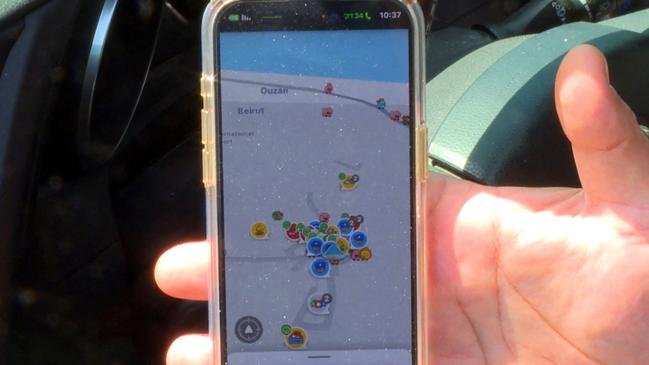Israel scrambles GPS signals as country girds for potential retaliation from Iran
Perplexed Israelis woke up to find map apps on their phones placing them in Beirut. The IDF say the GPS scrambling – used to confuse targeting systems for weapons – was to protect the country.

Perplexed Israelis woke up Thursday in Tel Aviv to find that map applications on their phones were placing them in Lebanon’s capital, Beirut, some 130 miles (200km) to the north. Cabdrivers couldn’t navigate. Food-delivery apps were temporarily out of service.
The reason: The Israeli military was scrambling GPS signals, as the country braces for possible retaliation by Iran or one of its allied militias for a suspected Israeli airstrike Monday on an Iranian diplomatic building in Syria. The attack killed a senior Iranian general and six other military officials, and marked an escalation of t he yearslong shadow war between Israel and Iran, with the potential to explode into direct conflict.
“With God’s help we will make the Zionists repent for their crime of aggression against the Iranian consulate in Damascus,” Iran’s Supreme Leader Ali Khamenei said Wednesday in a post in Hebrew on X.
Analysts say a direct Iranian strike on Israel is unlikely. Yet, in an apparent mobilisation for potential hostilities, the Israeli military on Thursday said it would pause all leave for combat units “in accordance with the situational assessment.” A day earlier, Israel drafted reservists to boost air defences.
Israel has withdrawn some of its ambassadors and evacuated its embassies in multiple locations, and some ambassadors have been asked not to appear at public events, according to a person familiar with the matter.
With trepidation growing, several Israeli municipalities near Tel Aviv put out announcements to calm residents and refresh guidance for emergency situations. The city of Holon told citizens that it would open public shelters and, if necessary, underground parking lots for those without a shelter in their home.
The Israeli military said the GPS scrambling – which can be used to confuse targeting systems for weapons – was part of an effort to protect the country.
“Today we initiated GPS disruption in order to neutralise threats,” Israeli military spokesman Daniel Hagari said Thursday.

“We are aware that this disruption causes discomfort but this is an essential and necessary tool in our defence capabilities.”
A 35-year-old marketing employee in Tel Aviv woke up on Thursday to find that his GPS services had located him in Beirut. Driving toward his tennis lesson without GPS navigation, he wasn’t the only confused driver on the roads, which were jammed with traffic. On his way back home, he tried to use a taxi app instead, but that didn’t work either.
“I’m not usually an anxious person, but it’s scary to know that something is going to happen,” he said.
Israel has sporadically disrupted GPS signals since the start of its war with Hamas in early October, but mainly in the north of the country, where the Iranian-backed Hezbollah militia has lobbed rockets at Israeli towns and military bases. It also has scrambled signals in southern Israel, mainly around the city of Eilat, the target of missile and drone attacks by Iranian-backed Yemeni and Iraqi militias, according to Yigal Unna, former director general of the Israel National Cyber Directorate.
The GPS disruptions have intensified since the Monday strike in Damascus, and spread to central Israel, including Tel Aviv, where a taxi driver said his maps application had located him at the Rafic Hariri International Airport in Beirut. In the south of the country, and in Jerusalem and the occupied Palestinian West Bank, GPS devices this week placed users in Cairo.
Mohammad Abdelhalim, founder of the Palestinian navigation app Doroob, who lives in Ramallah, said that signal interruptions had occurred regularly on various platforms that relied on GPS since the Oct. 7 Hamas-led attacks on Israel, ranging from a few minutes to several hours at a time.

The Israeli military recommended that Israelis manually set their location on the official Home Front Command app to be able to receive rocket alerts for the correct area, despite the GPS scrambling.
Israeli security forces are using a practice called GPS spoofing, which interferes with GPS receivers such as those in smartphones and falsifies the actual location of a device, and which can divert GPS-guided weapons like drones, Unna said. Spoofing has also been used by Ukraine against Russian drones. The fake signals can either divert the drone off its intended trajectory, or trick the drone – usually a civilian consumer model – into thinking it has entered a geofenced or no-fly zone, causing it to crash.
Spoofing can pose other risks, beyond being a nuisance for citizens. Distorting signals can create challenges for civilian and commercial planes that use GPS for navigation. Spoofing can also throw guided missiles that use GPS off their trajectory, with unpredictable risks to civilians.
The two most frequently used locations for spoofing by Israel are the airports in Beirut and Cairo, he said, adding that GPS spoofing is “pretty effective” as a countermeasure but doesn’t work on all weapons systems and can disrupt everyday life. “The problem, like any medicine, is the side effects,” Unna said.
Amos Yadlin, a former head of Israeli military intelligence, said Iran appears determined to make “a deterrent and immediate response,” possibly as early as Friday, which in Iran marks Quds Day, or Jerusalem Day, an annual pro-Palestinian event.
Yadlin said on X that Iran’s options include attacks against Israeli diplomatic representations abroad; expanding its nuclear program; increasing support for its allied militias in the Middle East; and conducting attacks through those militias.
Analysts with expertise in Iran and its elite Islamic Revolutionary Guard Corps, or IRGC, say the chances of a direct Iranian strike on Israel are slim, particularly because Tehran doesn’t have the capabilities to defeat Israel militarily and is struggling to contain public unrest at home.
“Instead, if the IRGC is to directly respond, we can expect Tehran to fabricate false claims about ‘Mossad operation centres’ in third-party nations – such as Iraqi Kurdistan or even Azerbaijan – to provide the IRGC with space to conduct symbolic strikes for propaganda purposes, but without fear of any direct Israeli retaliation,” said Kasra Aarabi, director of IRGC research at United Against Nuclear Iran, a US-based advocacy organisation.
An adviser to Iran’s Revolutionary Guard also said to expect a form of retaliation on Thursday or Friday, saying Iran would choose an action proportional to the Israeli attack in Damascus.
– WSJ







To join the conversation, please log in. Don't have an account? Register
Join the conversation, you are commenting as Logout